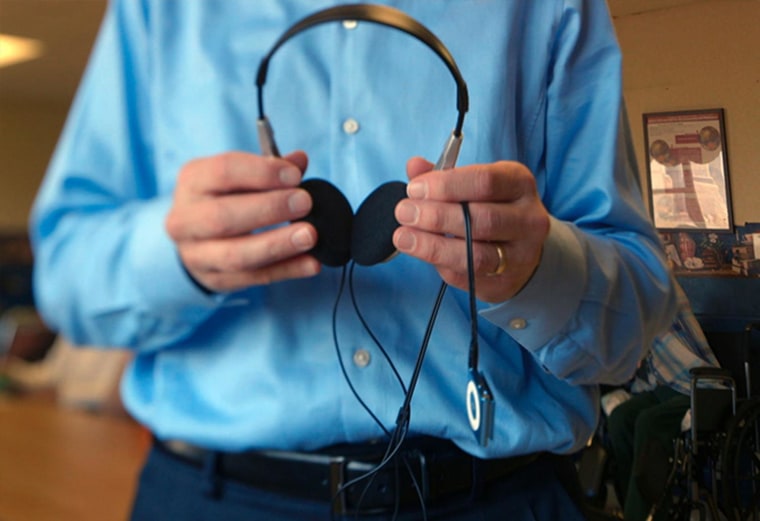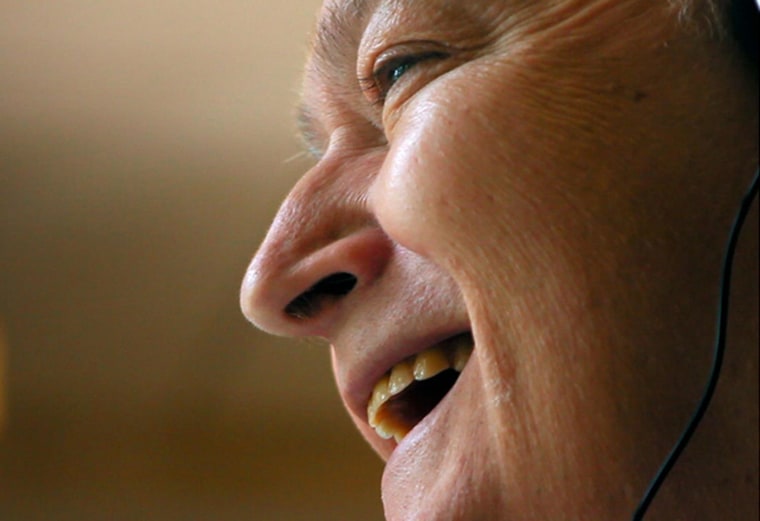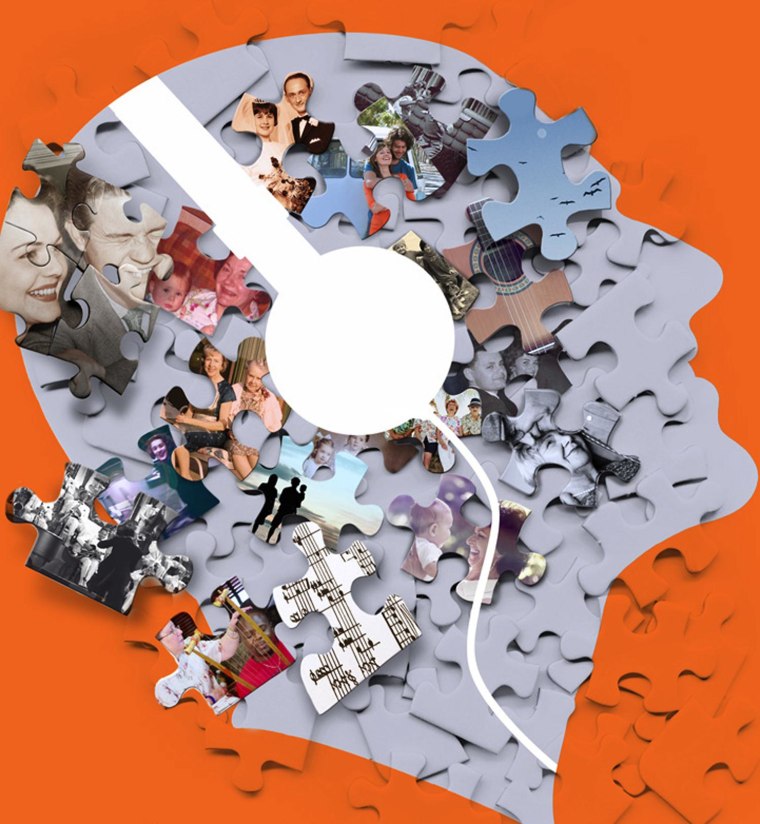
In the beginning, filmmaker Michael Rossato-Bennett had planned on following Dan Cohen for just one day. Cohen, a social worker and founder of the nonprofit organization Music & Memory, had wanted someone to document what he was witnessing in nursing homes, something he thought was extraordinary.
What Cohen was witnessing was the powerful reaction elders with dementia had when he played them music they loved; it was as if a deeply submerged internal light had suddenly been switched on. Vacant stares were broken with blinks of recognition; gradual smiles gave way to waves of joy; tears of gratitude often followed.
What Rossato-Bennett saw that day changed the trajectory of his life; he spent the next few years documenting Cohen’s mission to bring personalized music to every nursing home in America -- Cohen began his project in just two homes and now works with 650. The result is “Alive Inside,” a documentary which won the Audience Award at this year’s Sundance Film Festival and opens next month in New York.
Although the film is a full-throated celebration of music’s transformative benefits for elders with dementia, and incorporates supporting interviews with experts including renowned neurologist Dr. Oliver Sacks, Rossato-Bennett is the first to put music’s power in its proper context.
“This is not a cure. It’s not a drug, and it really shouldn’t be talked about in those terms.”
But he does have one bold prediction.
“My prediction is that the film is going to come out and within six months to a year we will have a bill on the house floor and personalized music will be reimbursable.”
The filmmaker has already taken his work one step further, developing an “Alive Inside" app, which will be given away to schools, universities and churches with the goal of encouraging young people to help elders create their playlists.
Here, the filmmaker discusses the isolation elders experience in care facilities, why baby boomers will transform how America cares for its aging, and how a woman with early-onset Alzheimer's forever changed the way he listens to music.
The film is inspiring in many ways, but some viewers may be left wondering whether they missed an opportunity to connect with their own elderly relatives through music.
It kind of makes you think about opportunities that you didn’t know you were missing. I’ve had a very tragic sort of moment happen to me many times: people have come up to me and said, “Oh my God, my father was a concert violinist, and I’m a concert violinist, and I went to the nursing home every day, and I never once thought to bring him his music.” That’s the level of blindness in a way that we have as a culture right now. Many other cultures have space for death and dying in the culture, we are just particularly blind and afraid of this particular life transition.
It seems counterintuitive that as a culture we place little value on growing old, when it’s a stage in life that we will all, hopefully, come to experience. What drives that in your view?
This is all the things I learned on this project. I never understood how obsessed we are with productivity in our culture. When a person becomes unproductive, they literally have no value in our culture. It used be that there was something called wisdom, human wisdom, which still exists -- it’s not like there isn’t human wisdom -- but it’s just that it almost doesn’t register on the barometer of our social consciousness. And that’s an amazing thing to come to terms with.
I never understood how obsessed we are with productivity in our culture. When a person becomes unproductive, they literally have no value in our culture.
The awakening that the music triggers, how long does that window of heightened engagement last, and are those windows temporary breakthroughs or is the progress cumulative?
That’s a very interesting question. Dr. Connie Tomaino, from the Institute of Music and Neurological Function here in New York City, is Oliver Sacks’ partner at Beth Abraham, and they did a study, and basically what the study discovered is that if you give people music a number of times per week in this way, it actually keeps their scores from declining.
Somebody without music in a nursing home, declines rather rapidly. With music they don’t. And I’m not 100% sure what this means, because in the end, especially with Alzheimer’s, they all decline. But for a period of time, it can keep their scores from declining. I think what it’s doing is it’s creating pathways, so it’s sort of finding new ways that haven’t been used and, while things are decaying, new ways are being discovered. And there’s new research on the plasticity of the human brain, that indicates, unlike what we thought years ago, you can make new brain neurons at any time in your life, so I think there is some mental aliveness that is happening because of this.
The music doesn’t just seem to build a bridge to the past, it seems to draw someone more directly into the present. Do you think that once individuals are in a facility that there’s a vicious cycle whereby the isolation and dependency there compounds their medical issues?
Absolutely. This is the thing that we’re battling with. It took me a long time to figure this out, but if you think about it, if I gave you your music, you’d be like, “Oh, that’s really great. Thank you.” But it wouldn’t be earth shattering. So, what does it say about the situation they’re living in, that when they just get their music from their past, that they have a profound reaction.
What does it say about the situation they’re living in, that when they just get their music from their past, that they have a profound reaction.
It took me a long time to understand this. When people enter a nursing home, they begin to fade almost immediately. First of all, if you have dementia, your brain isn’t capable of filtering out sounds and stimulus in the way that you and I can, and you’re completely separated from anything that you’ve ever had in your entire life. So, you’ve lived your whole life, and all of a sudden you’re in this strange bed being treated like a thing and, you know, if I took you and I put you in a nursing home and I said this is the rest of your life, you would say, “Forget it!” And you would fight me and you would leave. Well, now, imagine you couldn’t fight me. That you had to accept that this was the rest of your life.

It can be uncomfortable and difficult for people to consider that being placed in care can affect someone’s spirit, especially because placing a relative in care is often a complex, fraught decision. Can you talk about that?
This is one of the darkest questions that we have as a people. We live in a society where to care for somebody is to give up your own life, and that’s because we’re in such an isolated world. When I was growing up, there was a woman with dementia who lived next door and she lived with her daughter, but there were seven daughters who lived within two blocks. So, nobody cared for her because everybody cared for her, and it didn’t ruin anybody’s life because she needed so much care. Everybody just put in some time, during the day, during dinner, it wasn’t a thing.
We live in a society where to care for somebody is to give up your own life, and that’s because we’re in such an isolated world.
But today in our isolated world it becomes an incredible sacrifice to care for somebody. And nursing homes are filled with amazing, wonderful, beautiful people who deeply care and in no way do I mean any disrespect for them; what I’m trying to bring to the surface are these questions. One of the things I realized making this film, is that the disconnection that these people feel is why they fade. And then people on the outside, many of them also feel a deep disconnection; you feel that way whenever a living thing is asked to be an object.
Baby boomers will likely be powerful advocates for aging in place for as long as possible. Do you see their influence revolutionizing elderly care in this country?
Yes, I think that the baby boomers are about to discover what it’s like to not be in the driver’s seat, so while they’re still in the driver’s seat they better change this. Because a little string of bad luck, an illness, and literally almost anyone could end up in a facility, and I think this does need to be rethought, and I think the baby boomers are going to rethink it.
Baby boomers are about to discover what it’s like to not be in the driver’s seat, so while they’re still in the driver’s seat they better change this.
We’re in a time of massive transformation, and it’s going to be the most amazing hundred years from now onward. One day it dawned on me: If we can use music to make people happier, to make them age in place easier, to make caring for them easier -- which music does, I mean that’s beyond a shadow of a doubt for me -- worldwide we’ll actually save hundreds of billions of dollars. Because if you can delay people going into care, when you’re dealing with the cost of it, you’re literally talking about saving hundreds of billions of dollars. Can you imagine that?
Two elders featured in the film, John and Henry, both reference romantic love when they hear the music. What do you think is at the root of that?
Wow, that’s a beautiful question. I mean now you’re getting very deep. There’s a couple of things you can talk about. One is that one of the reasons why elders are in these situations is because they’re moving into another world, and that process of moving into another world actually allows them to find life even in the presence of their own death. It’s part of dying; as you age you actually appreciate the very moment of life, and all music really is, I believe, is a riff on the heartbeat that we spent nine months with our ear to.
As you age you actually appreciate the very moment of life, and all music really is, I believe, is a riff on the heartbeat that we spent nine months with our ear to.
So, music is what all religion is: it’s faith that there is a beat, and then there will be another beat. And then there will be another beat, and that beat will go on forever, and that’s what faith is and that’s what love is. That I will receive from just my presence, my closeness to that beat, that love. You put your head on your mother’s heart and she hugs you. We breastfeed to a drum, which is the human heart.
Have you made your own playlist?
One day I was filming Mary Lou [one of the film’s subjects who had Early Onset Alzheimer's] and I looked over at her and I thought, “Oh my God, this woman, who has half of her mind erased, is listening to music in a more profound way than I do.” And I went home that night and I turned off all my lights, and I went through all my music and I tried to listen to it like her. And I found the pieces that I could hear with my memory and my whole being, and that I could surrender all of everything to. And I’m very grateful to her for challenging me in that way. And I think that the challenge of this movie, is for people to have that experience themselves, to go back into their own music, and try and experience it on a level that these people do. They’re showing us the capacity of the human being to experience music, and they are human beings who have lost the capacity to lie, so their experience of music is actually a teaching to all of us who think we are so profound.
This interview has been edited.
For more information and inspiration visit MariaShriver.com
